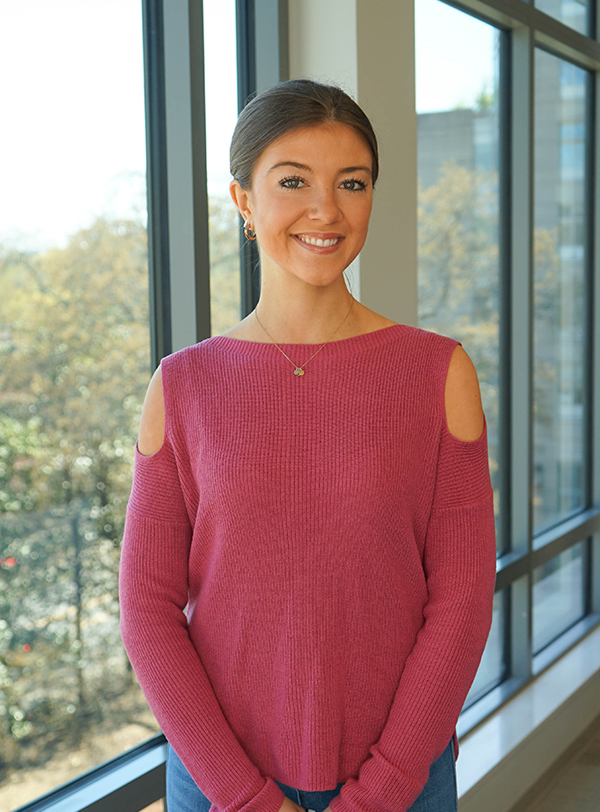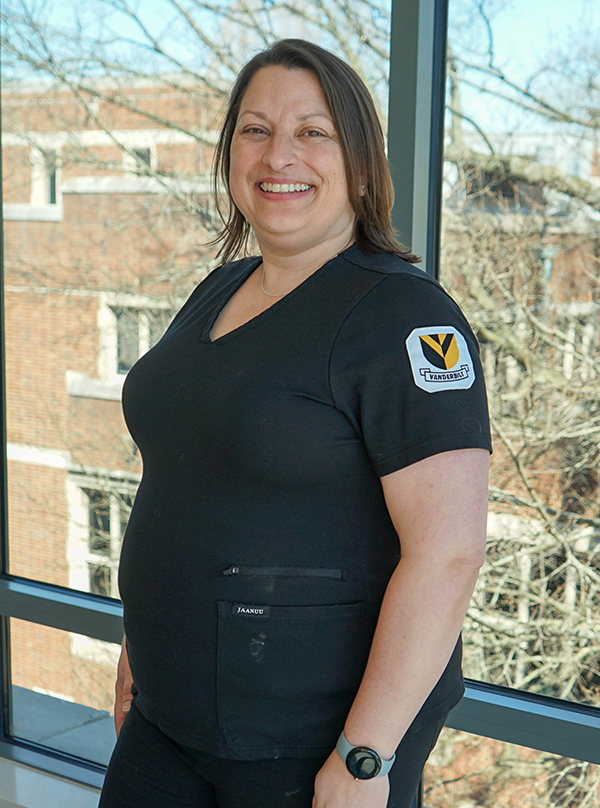Kendra Phillips: Passion for Patient Care

“I have a deep love for patient interaction and care,” she says. “My desire is to treat and care for patients, not prioritize the diseases and conditions.”
Phillips currently works as a clinical trials associate at Vanderbilt University Medical Center. She often meets with patients, but feels she is limited in her ability to offer support. Through her job, however, she found herself wanting to be more involved with patient care.
“That experience sparked a desire in me to want to take that next step into nursing,” she says. “I want to become the nurse who is also the educator and resource connector, who helps patients have better health outcomes.”
Phillips looks forward to the opportunity to one day educate and influence patients in ways that not only treat symptoms, but improve their lives.
“Nursing is unique in that we are skilled in providing care that is holistic, patient centered and considers the social determinants of health,” she says. “Being knowledgeable about medical conditions, procedures and external factors influencing patient health is what makes this career special. We are the eyes on the ground and, in some cases, the glue of the health care system.”
As she works her way through the MN program, Phillips is excited about becoming a registered nurse and about how her understanding of health care has grown. She says she values this time where she is able to explore the many different kinds of nursing RNs can do. She intends to use that exploration to help her determine her future and one day, step into the role of an advanced practice nurse.
Learn more about Vanderbilt’s MN Program
Sarah Patton: Empathy and Connection

After graduating with a bachelor’s degree in health sciences and a medical Spanish minor under her belt, Sarah Patton took on the role of patient care coordinator at a bariatric surgery clinic. As she became more exposed to the medical assistant role, she found joy in meeting patients one-on-one and building relationships. Looking for opportunities to build upon this experience, Patton has found an occupation in which she can form personal connections through health care practices.
Following inspiration from a family friend in the health care field, Patton was drawn to nursing and applied for Vanderbilt’s new master of nursing program. She says she appreciated the emphasis on health equity and was drawn to its holistic approach.
Having previously studied public health, she had already been exposed to social determinants of health—and she also had first-hand knowledge of how it impacts people. Patton describes how her mother moved to a rural town with an underserved population, with no access to health care
for many miles, and how that influenced the community. She says she observed firsthand how one person could impact
the population.
Patton has been embracing the full impact of her MN program and its enriching experiences. These opportunities have included using advanced technologies that create a realistic simulation for students to better relate to their geriatric patients, such as by utilizing virtual reality headsets to simulate hearing or vision loss. Through these encounters, Patton says she gains an invaluable perspective and empathy toward those receiving care.
Alicja Lanfear: The Science of Nursing
 Alicja Lanfear moved to the United States from Australia on a tennis scholarship in 2002. Since then, she received her PhD in forensic anthropology, compiled vast research, and worked as a professor at Middle Tennessee State University and the University of Tennessee.
Alicja Lanfear moved to the United States from Australia on a tennis scholarship in 2002. Since then, she received her PhD in forensic anthropology, compiled vast research, and worked as a professor at Middle Tennessee State University and the University of Tennessee.
For more than ten years, Lanfear’s expertise has focused on human biology and brought her a great deal of experience and accolades. Not only is she a distinguished forensic anthropologist, but she is also a wife and mother.
Before entering the VUSN program, Lanfear had been a technician and certified medical assistant at Vanderbilt University Medical Center, where she “fell in love with the hospital.” She appreciates that the MN program curriculum has “started right out the gate.” Lanfear says she hopes to gain a few years of critical nurse experience before possibly pursuing an advanced nursing practice specialty.
With her background in forensic anthropology, Lanfear feels that she is well-prepared to take on the nursing process. Her intuition is to question, prompt and seek reasoning—all essential components of critical thinking in nursing. Lanfear relishes how nursing can blend her critical thinking skills with empathic and holistic practices. She also appreciates how her courses are providing her with new experiences and realizations.
“The most impactful experience, so far, was getting dressed in a kit with tension hands that simulate arthritis, having weights on and feeling how it is to move as if I were a senior,” she says. “There’s the factor of how much energy and intention of movement has to happen before the actual movement takes place. That was interesting to see. I didn’t realize how much energy it takes even to initiate movement for our aged population.”
Profiles by Judy Campbell and Tatum Lyles Flick
Photos by Caroline Taylor
Learn more about Vanderbilt’s MN Program